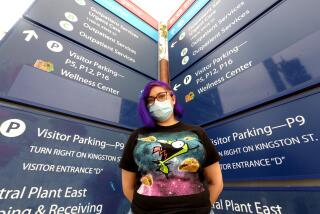LAGUNA BEACH : Community Clinic Is Back in the Black
- Share via
After teetering near bankruptcy last year, the Laguna Beach Community Clinic, which this week celebrates its 20-year anniversary, has made “quantum leaps” toward financial stability, board President Ronald Woelfle said Wednesday.
At the same time, clinic goals are shifting, both to adapt to a changing population and to ensure that the clinic will stay open, workers say.
Changes include emphasizing to patients that they have a responsibility to pay if they can, said Carmen Gutierrez, director of medical patient services. Those who cannot pay are not turned away.
There is considerable shifting behind the scenes as well. For example, new members of the board of directors--traditionally social- and health-care specialists--are now more likely to be skilled in marketing or banking, Woelfle said.
In January, a 20-member advisory committee and a 25-member fund-raising group called Friends of the Clinic were formed. The changes, combined with the city’s decision late last year to forgive a $20,000 debt, have helped save the battered health-care center, Woelfle said.
Tuesday night, approximately 400 people attended the $12-a-plate anniversary dinner, twice last year’s turnout, Woelfle said.
“It’s a very happy time,” he said. “Not only are we solvent, but year to date we have a small profit, which beats being bankrupt. . . .”
As 1989 came to a close, the future of both the medical center at 460 Ocean Ave. and the counseling center at 255 Thalia St. was bleak.
The clinic, which cut back its hours last fall in response to the financial crunch, plans to restore some services within the next six months, Woelfle said. Currently the clinic, which also offers dental service, is open staggered hours from Monday through Saturday.
While 20 years ago the clinic struggled to meet the needs of a generation of wandering youth, workers say they now must scramble to fill a health-care gap for entire families, including recent immigrants.
“I think essentially what we see is a clinic that has veered itself to what society’s needs are at any given time,” said Pauline Walpin, a registered nurse who worked as a clinic volunteer in 1972 and has recently helped restructure the way the medical clinic is run. “One of the things we feel we can do very effectively is be a family-center clinic, because that’s the thing we see as very necessary now.”
More to Read
Sign up for Essential California
The most important California stories and recommendations in your inbox every morning.
You may occasionally receive promotional content from the Los Angeles Times.













